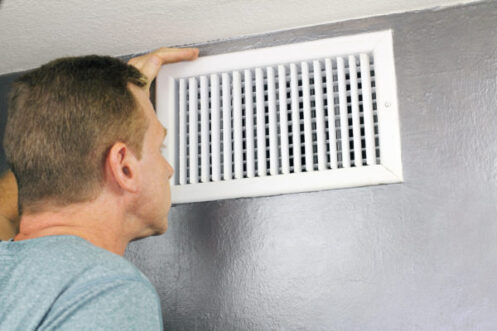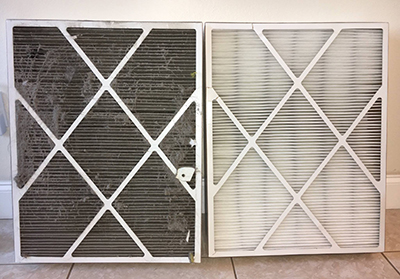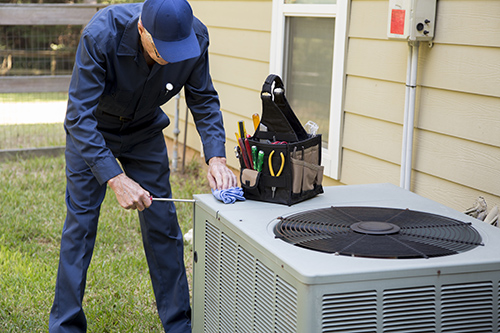
Updated August 2023
Short cycling is a serious problem that can limit your air conditioning system’s ability to keep your home cool. It also increases the wear and tear on your system and can cause your AC condenser to need more frequent repairs. It may shorten the condenser’s lifespan, forcing you to replace it sooner. Here is everything you need to know about short cycling, including what it is, what makes it happen, and when to call a professional.
What Is Short Cycling?
Short cycling is when the AC condenser turns off without completing an entire cooling cycle. Once your AC has cooled your home down to the set temperature, it should only need to run for a short period each time to maintain the correct temperature.
When working correctly, your system will typically perform two or three cooling cycles per hour. Each one will last between 10 and 15 minutes. Ten minutes is generally the minimum time it takes to complete one cycle. If your system runs for less than 10 minutes, the condenser might be short cycling. Here are a few reasons why an AC system might be short cycling.
Improperly Sized AC Unit
If your AC unit is too small for the size of your home, it typically results in the system running almost constantly. When the unit is too small, it won’t be able to remove as much heat as it needs to maintain your home’s temperature. If the AC unit is oversized, it will typically short cycle virtually every time it turns on.
A larger AC unit will remove much more heat in a shorter time, which means it will only take a few minutes to cool the home down to the target temperature. While this may sound like a good thing, it puts significant strain on the condenser since it will always shut off without completing an entire cycle.
Unfortunately, the only way to fix this issue is to replace the AC unit with one that is the correct size for your home. Doing this will likely cost you a few thousand dollars and a call to a professional, but it is something you can’t avoid since short cycling will often cause an oversized AC unit to wear out within a few short years.
Clogged Air Filter
 Dirty air filters are one of the most common reasons an AC will short cycle, and this is always the first thing to check. A dirty filter restricts the air that can flow through the system. This causes hot air to build up inside, leading to overheating. If the AC condenser overheats, it will automatically shut off to prevent damage to the compressor motor. As a result, your system will shut off without completing an entire cycle.
Dirty air filters are one of the most common reasons an AC will short cycle, and this is always the first thing to check. A dirty filter restricts the air that can flow through the system. This causes hot air to build up inside, leading to overheating. If the AC condenser overheats, it will automatically shut off to prevent damage to the compressor motor. As a result, your system will shut off without completing an entire cycle.
Dirty or Frozen Evaporator Coil
The evaporator coil absorbs latent heat from inside the home, and this is how your AC reduces indoor temperature. When the evaporator coil is caked with dust and dirt, it severely limits how much heat it can absorb. Again, this leads to heat building up inside the system and the AC condenser shutting off due to overheating.
Your evaporator coil can also freeze for various reasons. It commonly happens because the coil is dirty or the air filter is clogged. The coil can also freeze due to low refrigerant levels or when you run your AC at night when the outside temperature is low. If the evaporator coil is frozen, it can’t absorb heat, causing overheating and short cycling.
If your evaporator coil is frozen, turn your AC off and wait for it to thaw completely. This usually only takes a few hours, but it could take up to a full day. Once it thaws, turn your AC back on and monitor the coil to see if it freezes. If it happens again, contact a certified HVAC technician to inspect your system.
Low Refrigerant Level
Your AC requires a certain amount of refrigerant to operate. This is also called the “charge.” If the charge is too low, it can cause the evaporator coil to freeze. Even if the coil doesn’t freeze, a low refrigerant charge will force the system to work much harder since it can’t remove as much heat from your home. As with most other issues, this will eventually result in overheating and cause it to short cycle.
An AC technician can quickly check to see if your system has the correct charge. If not, they will recharge the system with more refrigerant to ensure proper operation.

Malfunctioning Thermostat
Thermostats can sometimes fail to measure indoor temperature accurately. When this happens, it signals the system to shut off before it should and causes it to short cycle. This problem might occur if your thermostat is too close to a supply register. In this situation, the cold air flowing from the supply register will cause the thermostat to think the home is cooler than it really is. As a result, it will signal the condenser to shut off before it completes an entire cycle.
Faulty Low-Pressure Control Switch
The refrigerant always needs to be at a certain pressure for your AC to operate, and the low-pressure control switch measures and regulates the pressure to ensure this is the case. Over time, the control switch can wear out or malfunction, which causes the refrigerant pressure to drop. When the pressure is too low, the evaporator coil will freeze, and the system will overheat. The only solution to this issue is to have a technician inspect the switch and replace it if it isn’t working correctly.
Failing Compressor Motor
When the compressor motor begins to fail, it is often unable to run long enough to complete an entire cycle. If this happens, it usually means that you will need to replace your AC unit. While a technician can replace the motor, it is usually never worth it because the cost of doing so is typically about the same as the cost of replacing the entire unit.
That said, if your unit is less than five years old, then it is usually more cost-effective to replace the compressor motor. Most AC manufacturers provide a five-year warranty on the compressor motor that covers the cost of all replacement parts.
Trusted AC Repair Experts
 If your AC is short cycling or your evaporator coil is constantly icing up, the friendly, knowledgeable technicians at Beyer Air Conditioning & Heating are here to solve your problem. We work on all types of AC units from any manufacturer, and our certified technicians can repair multiple AC issues. Our team can maintain your AC system, which is the best way to prevent short cycling and most other problems. We also specialize in installing new AC units and condenser replacements. In addition, we offer a full range of heating and air duct service for customers in the greater San Antonio area. Call Beyer Air Conditioning & Heating today for your HVAC system needs!
If your AC is short cycling or your evaporator coil is constantly icing up, the friendly, knowledgeable technicians at Beyer Air Conditioning & Heating are here to solve your problem. We work on all types of AC units from any manufacturer, and our certified technicians can repair multiple AC issues. Our team can maintain your AC system, which is the best way to prevent short cycling and most other problems. We also specialize in installing new AC units and condenser replacements. In addition, we offer a full range of heating and air duct service for customers in the greater San Antonio area. Call Beyer Air Conditioning & Heating today for your HVAC system needs!



